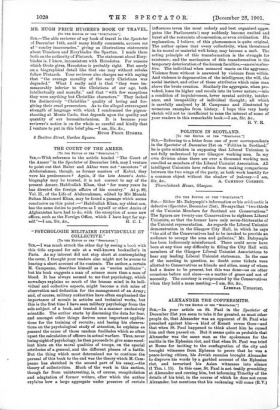" PSYCHOLOGIE MILITAIRE INDIVIDUELLE ET COLLECTIVE. "
[To THE EDITOR OF THE " SPECTATOR." j SIR,—I was much struck the other day by seeing a book with this title exposed for sale at a well-known bookseller's in Paris. As my interest did not stop short at contemplating the cover, I thought your readers also might not be averse to hearing a short account of its contents. The author, a certain M. Campeano, describes himself as an " ancien milltaire"; but his book suggests a man of science more than a man of blood. It has always seemed to me that psychology, which nowadays explains so much of the human mind in its indi- vidual and collective aspects, might become a rich mine of observation and deduction for the management of an Army; and, of course, military authorities have often emphasised the importance of morale in articles and technical works, but this is the first time I have seen military psychology form the sole subject of a book, and treated in a manner exclusively scientific. The author starts by discussing the data for fear, and amongst other things derives some important applica- tions for the training of recruits ; and basing his observa- tions on the psychological study of attention, he explains en passant the cause of those random fusillades which so often upset the calculation of officers in actual warfare. Thus, never losing sight of psychology, he then proceeds to give some excel- lent hints on the moral qualities of troops, on the special attributes of a general, and the different phases of a battle. But the thing which most determined me to continue the perusal of this book to the end was the theory which M. Cam- peano has sketched in the second part of his essay,—the theory of collectivities. Much of the work in this section, though far from uninteresting, is, of course, recapitulation and adaptation of former writers, after which the author explains how a large aggregate under pressure of certain influences (even the most orderly and best organised aggre- gates like Parliaments !) may suddenly become excited and burst all the restraints of convention, or even civilisation. His explanation, I believe, of this phenomenon is quite original. The author opines that every collectivity, when threatened in its moral or material well-being, may become a mob. The acting principle of this transformation is the struggle for existence; and the mechanism of this transformation is the temporary deterioration of the human faculties,—ananimalisa- tion. The individual when menaced reacts on the aggressor. Violence from without is answered by violence from within. And violence is degeneration of the intelligence, the will, the social instinct, and other of those attributes which raise man above the brute creation. Similarly the aggregate, when pro- voked, loses its higher and recoils into its lower nature,—into a condition of impulsiveness, lower mental activity, intoler- ance, and incapability of individual thought ; all which is carefully analysed by H. Campeano and illustrated by numerous examples from history. I hope this very hasty sketch will not be insufficient to raise the interest of some of your readers in this remarkable book.—I am, Sir, &c.,
H. V. R.


































 Previous page
Previous page